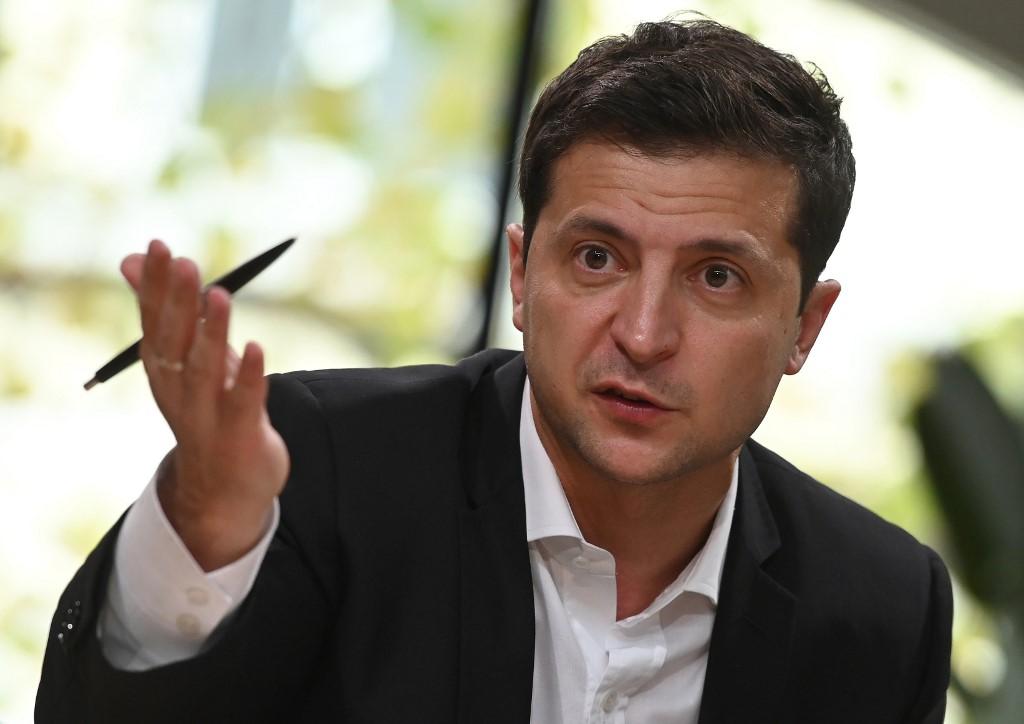Zelensky accuses Russia of 'terror' as missiles rain down

Missiles rained down on Ukraine killing many civilians and wounding dozens in built up areas as the weekend began, prompting President Volodymyr Zelensky to accuse Russia of state "terror".
Strikes on a southern resort town left 21 dead and dozens wounded after missiles slammed into flats and a recreation center in Sergiyvka, 80 kilometers (50 miles) south of Black Sea port Odessa.
Rockets struck residential properties in Solviansk in the heart of the embattled Donbas region, killing a woman in her garden and wounding her husband, a neighbor told AFP Saturday, describing debris showered across the neighborhood.
The witness said the strike on Friday was thought to use cluster munitions which spread over a large area before exploding, striking buildings and people who were outdoors.
The attacks came after Moscow abandoned positions on a strategic island in a major setback to the Kremlin's invasion.
Victims of the Sergiyvka attacks included a 12-year-old boy, Zelensky said in his daily address to the nation, adding that some 40 people have been injured and that the death toll could rise.
"I emphasize: this is an act of deliberate, purposeful Russian terror -- and not some kind of mistake or an accidental missile strike," Zelensky said.
"Three missiles hit a regular nine-story apartment building, in which nobody was hiding any weapons, any military equipment," he added. "Regular people, civilians, lived there."
'Cruel manner'
Germany swiftly condemned the violence.
"The cruel manner in which the Russian aggressor takes the deaths of civilians in its stride and is again speaking of collateral damages is inhuman and cynical," said German government spokesman Steffen Hebestreit.
The attacks follow global outrage earlier this week when a Russian strike destroyed a shopping center in Kremenchuk, central Ukraine, killing at least 18 civilians.
President Vladimir Putin has denied his forces were responsible for that attack and Moscow made no immediate comment on the Odessa strikes.
On Friday, Zelensky hailed a new chapter in its relationship with the European Union, after Brussels recently granted Ukraine candidate status in Kyiv's push to join the 27-member bloc, even if membership is likely years away.
"Our journey to membership shouldn't take decades. We should make it down this road quickly," Zelensky told Ukraine's parliament.
The president of the European Commission Ursula von der Leyen, addressing Ukrainian lawmakers by video link, said membership was "within reach" but urged them to work on anti-corruption reforms.
Norway, which is not an EU member, on Friday announced $1 billion worth of aid for Kyiv including for reconstruction and weapons.
And the Pentagon said it was sending a new armament package worth $820 million, including two air defense systems and more ammunition for the Himars precision rocket launchers the United States began supplying last month.
Soup spat
In a decision that further cooled relations between Kyiv and Moscow, the UN's cultural agency inscribed Ukraine's tradition of cooking borshch soup on its list of endangered cultural heritage.
Ukraine considers the nourishing soup, usually made with beetroot, as a national dish although it is also widely consumed in Russia, other ex-Soviet countries and Poland.
UNESCO said the decision was approved after a fast-track process prompted by Russia's invasion of Ukraine.
We "will win both in the war of borshch and in this war," said Ukraine's Culture Minister Oleksandr Tkachenko on Telegram.
Russian foreign ministry spokeswoman Maria Zakharova said: "Hummus and pilaf are recognized as national dishes of several nations. Everything is subject to Ukrainization."
Phosphorus bombs
On Thursday, Russian troops abandoned their positions on Snake Island, which had become a symbol of Ukrainian resistance in the first days of the war, and sat aside shipping lanes near Odessa's port.
The Russian defense ministry described the retreat as "a gesture of goodwill" meant to demonstrate that Moscow will not interfere with UN efforts to organize protected grain exports from Ukraine.
But on Friday evening, Kyiv accused Moscow of carrying out strikes using incendiary phosphorus munitions on the rocky outcrop, saying the Russians were unable to "respect even their own declarations".
In peacetime, Ukraine is a major agricultural exporter, but Russia's invasion has damaged farmland and seen Ukraine's ports seized, razed or blockaded -- sparking concerns about food shortages, particularly in poor countries.
Western powers have accused Putin of using the trapped harvest as a weapon to increase pressure on the international community, and Russia has been accused of stealing grain.
Ukraine on Friday asked Turkey to detain a Russian-flagged cargo ship that Kyiv alleged had set off from the Kremlin-occupied port of Berdyansk.
While heavy fighting continued in eastern Ukraine, officials said schools in the Ukrainian capital would re-open at the start of the school year on September 1 for the first in-person classes since lessons went online after the invasion began.
Olena Fidanyan, head of Kyiv's education and science department, said land around schools will be checked for explosives and school bomb shelters will be restocked with essentials. —Agence France-Presse





